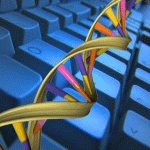Bioinformatics
|
16 may 2015 13:48:38 |
| A control system analysis of the dynamic response of N-methyl-D-aspartate glutamate receptors to alcoholism and alcohol withdrawal (Theoretical Biology and Medical Modelling) |
|
Tweet Background:
N-methyl-D-Aspartate (NMDA) and its receptors (NMDAR) play a critical role in glutamatergic neurotransmission. Ethanol molecules inhibit these receptors, and if the brain is exposed to ethanol chronically, NMDA-induced glutamatergic changes can result in physical dependence to ethanol in order to sustain normal brain function. In these cases, removal of ethanol from the system results in excitotoxic withdrawal. One compensatory mechanism the brain uses to regulate extracellular glutamate concentration is modulating the number of NMDARs at the synapse. Previous work has shown that the number of functional NMDARs at the synapse can be changed by three mechanisms: additional receptors can be synthesized and inserted, receptors can be recruited to the synapse from extrasynaptic regions, or the functionality of existing receptors can be modified.
Methods:
In this study, we consider the dynamic relocation control of NMDARs in response to chronic alcoholism and withdrawal. Specifically, we (1) propose and construct a mathematical model of the relocation control as a negative feedback system with an explicit set point, (2) investigate the effect of various ethanol consumption and withdrawal profiles on the NMDAR population, and (3) propose and calculate quantitative measures for the extent of withdrawal based on modeled NMDAR populations.
Results:
A relocation-only model with an explicit set point was developed. The model was shown to apply across a wide range of controller parameters. The results suggest that withdrawal severity does not depend upon the dynamics involved in the development of dependence, and that regulating the blood alcohol level throughout the progression of withdrawal can minimize excitotoxic withdrawal symptoms.
Conclusions:
The negative feedback control system produced characteristic behaviors of NMDAR populations in response to simulations of alcohol dependence and abrupt withdrawal. The model can also predict the severity of excitotoxic withdrawal following various alcohol consumption and/or withdrawal patterns in order to generate testable hypotheses regarding ameliorating withdrawal. |
| 157 viewsCategory: Bioinformatics |
 Modelling Circulating Tumour Cells for Personalised Survival Prediction in Metastatic Breast Cancer (PLoS Computational Biology) Modelling Circulating Tumour Cells for Personalised Survival Prediction in Metastatic Breast Cancer (PLoS Computational Biology)Methodological aspects of whole-genome bisulfite sequencing analysis (Briefings in Bioinformatics) 
|
| blog comments powered by Disqus |
MyJournals.org
The latest issues of all your favorite science journals on one page
The latest issues of all your favorite science journals on one page



